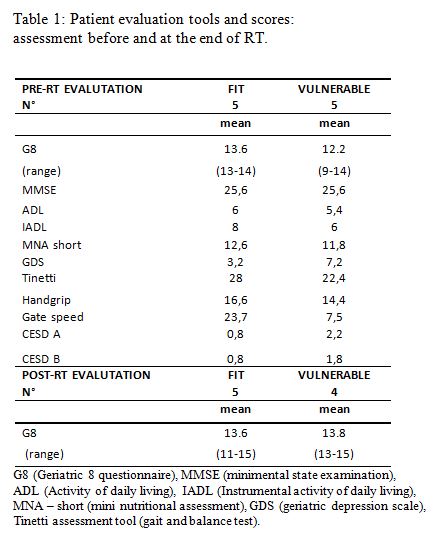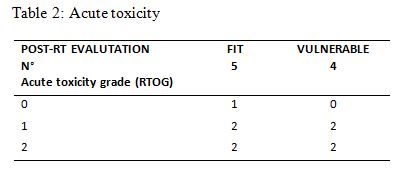Oncogeriatric assessment in elderly breast cancer patients: a monoistitutional experience
Lucrezia Gasparini,
Italy
PO-1455
Abstract
Oncogeriatric assessment in elderly breast cancer patients: a monoistitutional experience
Authors: Lucrezia Gasparini1, Fiorella Cristina Di Guglielmo1, Marzia Borgia1, Marianna Nuzzo1, Lucia Anna Ursini1, Angelo Di Pilla1, Luciana Caravatta1, Domenico Genovesi1,2
1SS. Annunziata Hospital, Radiation Oncology Unit, Chieti, Italy; 2G. D'Annunzio University, Department of Neuroscience, Imaging and Clinical Sciences, Chieti, Italy
Show Affiliations
Hide Affiliations
Purpose or Objective
Frailty
is defined as a multidimensional, heterogeneous and dynamic condition, that
could affect patient’s functional capabilities. Very often older patients are
considered frail and not included in clinical trial due to the incidence of
age–related concomitant pathologies, even if cancers, including breast cancer (BC),
are increasingly prevalent in older patients. A comprehensive multidisciplinary
assessment in this setting is important: in fact the European Society of Breast
Cancer Specialists (EUSOMA) and the International Society of Geriatric Oncology
(SIOG) recommends that decision making should not be driven by age alone, but
should involve different specialists evaluations. The aim of the study was the identification
frail patients with BC, candidate for curative radiotherapy (RT), and to
measure through an oncogeriatric multidimensional assessment the impact of
frailty on toxicities and treatment adherence.
Material and Methods
In our EUSOMA certified Center, a prospective
observational study was designed for all patients with > 75 years,
candidate for curative RT. All the patients with BC every week are discussed in
a multidisciplinary meeting. Frail
patients are identified by the radiation oncologist, before RT, using Geriatric
8 questionnaire (G8q). Patients resulted frail (score ≤ 14) undergo a
multidimensional geriatric assessment, investigating cognitive (MMSE, GDS),
functional (ADL, IADL, Tinetti), nutritional (MNA short) domains, to define the
frailty phenotype. G8q is repeated at the end of RT.
Results
From December 2019 to September 2021
a total of 175 oncologic patients were screened. In our current analysis, we considered
28 breast cancer patients (median age: 80; range: 75 - 86) that completed
treatment during this period. All the patients underwent G8q before and after RT.
Twelve patients (42.8%) were baseline identified as frail (G8q range 8-14) and 10
of them agreed to underwent a multidimensional geriatric assessment. Five of
the 10 patients resulted vulnerable, 5 patients fit for treatment (Table 1). One
vulnerable patient refused RT while the remaining were carefully monitored
during treatment, according to geriatric prescriptions. All frail patients
completed treatment without acute toxicity > grade 2 (RTOG) (Table 2). Overall,
only 1 no-frail patient (3.6%) reported acute skin toxicity > grade 3. The
G8q at the end of RT did not show a significant deterioration.


Conclusion
According to recent studies,
incorporating measurements of frailty in clinical trials is important to reduce
the risk of worse outcomes. In our experience, preliminary results confirmed
that Geriatric 8 questionnaire represents a simple tool to identify frail
patients in daily practice. Although this study is still ongoing, the support
of a multidisciplinary approach in vulnerable patients resulted useful in order
to obtain their compliance to the treatment without increased toxicity.